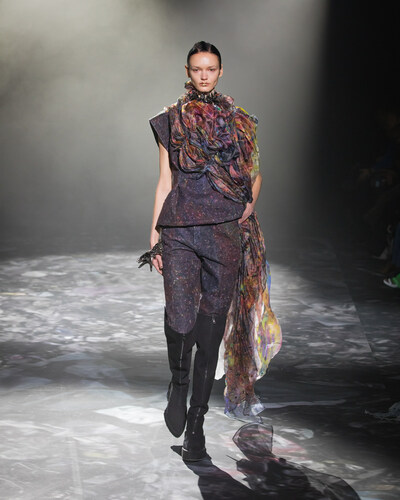– Partnership combines inkjet and dry fibre technologies to create stunning designs from recycled clothing –
HEMEL HEMPSTEAD, England, Jan. 30, 2023 /PRNewswire/ — Epson has partnered with renowned Japanese fashion designer Yuima Nakazato and his eponymous YUIMA NAKAZATO brand at Paris Haute Couture Fashion Week Spring – Summer 2023 to unveil creations that are both stunning and sustainable. In addition to utilising Epson’s digital textile printing to reproduce his unique and creative worldview, YUIMA NAKAZATO realised some of its creations with the help of a new, more sustainable and potentially industry-transforming textile production process.
Epson’s dry fibre technology, which is already used commercially to recycle office paper and which requires virtually no water, has been adapted to produce printable non-woven fabric from used garments. The new fabric production process was revealed in Paris as part of a three-year collaboration between Epson and YUIMA NAKAZATO and was used in the creation of items for the first time during the latter’s runway show at the Palais de Tokyo on January 25, 2023.
The collaboration between Epson and YUIMA NAKAZATO builds on the success of the company’s printing support for his couture and evolves the level of his creations to enable the low-impact production of high-quality custom garments. Both Epson and YUIMA NAKAZATO are keen to raise awareness of the water and material waste associated with excess production. The Paris Show illustrates how switching to digital textile printing using more environmentally friendly pigment inks offers the fashion industry a more sustainable and less wasteful means of textile printing.[1]
The fabric taken to create the latest YUIMA NAKAZATO fashion line was derived from material from used garments sourced from Africa, the destination for many discarded garments from elsewhere in the world. Nakazato visited Kenya where he collected around 150 kg of waste garment material destined for the “clothes mountain” of discarded textiles he encountered there. Epson then applied its dry fibre process to produce over 50 metres of new re-fiberised non-woven fabric, some of which was used for printing with pigment inks with Epson’s Monna Lisa digital printing technology.[2]
Hitoshi Igarashi from Epson’s Printing Solutions Division explains the importance of the technology: “Although in its early stages, Epson believes its dry fibre technology combined with pigment ink digital printing could offer the fashion industry a much more sustainable future, significantly reducing water use while allowing designers the freedom to fully express their creativity.
“Epson’s Environmental Vision is committed to contributing to a circular economy, and this development could be one step towards achieving this. Dry fibre technology applied to the fashion industry offers the possibility of producing material for new clothes that have been recycled from used garments.”
In a trial of distributed printing for venue decoration, Epson inkjet printers in Japan and France with remote support from Epson engineers were used to create decorations in the venue space. Both Epson and YUIMA NAKAZATO intend to continue exploring the possibilities for contributing to a more sustainable fashion industry.
About Epson
Epson is a global technology leader whose philosophy of efficient, compact and precise innovation enriches lives and helps create a better world. The company is focused on solving societal issues through innovations in home and office printing, commercial and industrial printing, manufacturing, visual and lifestyle. Epson’s goal is to become carbon negative and eliminate use of exhaustible underground resources such as oil and metal by 2050. Led by the Japan-based Seiko Epson Corporation, the worldwide Epson Group generates annual sales of more than JPY 1 trillion.
corporate.epson/en/
[1] Digital textile printing using pigment inks offers a more sustainable approach to the fabric production process compared with traditional analogue methods. In addition to pigment inks requiring significantly less water, the digital process requires far fewer stages and is less complex. Unlike analogue it requires no plate production, washing or storage, results in little disposal of used inks, and allows on-demand production that contributes to less waste.
[2] Epson’s Monna Lisa digital Direct-to-Fabric printers use less water compared with analogue methods. Pigment inks are more eco-friendly. Epson GENESTA pigment inks are GOTS approved by ECOCERT.
Photo – https://mma.prnewswire.com/media/1990622/Epson.jpg
Photo – https://mma.prnewswire.com/media/1990623/Epson_1.jpg
SOURCE Epson Europe




